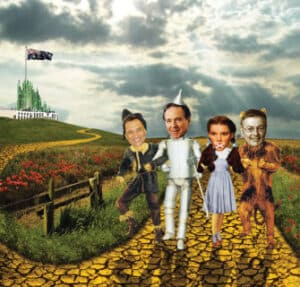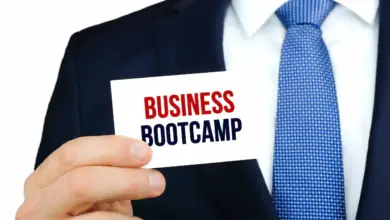Who speaks for the forgotten people?
Who speaks for the forgotten people? Caught between the ideological battles of unions and big enterprise, small business voices are marginalised in the political debate. Darren Horrigan finds out why small companies – despite employing half the Australian workforce – get shafted no matter who’s in power.
Former US President Ronald Reagan once said the nine most terrifying words in the English language were, ‘I’m from the government and I’m here to help’. So it remains for most of Australia’s 1.9 million small business owners. Talk to 100 entrepreneurs and 99 will tell you their success has been in spite of what local, state or federal governments do for them.
Nett could fill this edition with the promises, pledges and empathy extended to small business from politicians
In May 1995, John Howard gave Australia his now infamous promise about a goods and services tax. “There’s no way a GST will ever become part of our policy, never ever,” said the man who would be prime minister. Howard also promised to slash business red tape. In April 1996, the freshly minted PM established the Small Business Deregulation Task Force. Its mission was to reduce the compliance burden on small business by 50%.
‘Never, ever’ came to be in July 2000 and the Howard Government’s ‘simpler tax system’ morphed into a smorgasbord for accountants. Today, small businesses’ compliance burden is as onerous and expensive as ever.
What might big business make of such a double-cross? How would the trade unions react to such treachery?
It seems small business is trapped in a no-man’s land between establishment forces of big business on the right and the union movement on the left. Bereft of political patronage and with too many disparate voices to be heard as one, small business remains politically expendable.
Herding cats
Representing small business is a tough brief. The latest figures, published in 2007, from the Australian Bureau of Statistics (ABS) show there are 228,300 small firms with 5–19 staff and about 1.7 million micro-enterprises with less than four staff. This means 95.5% of all Australian businesses are small.
The Council of Small Business Organisations of Australia (COSBOA) is regarded as the premier voice of small business in this country. Its CEO, Tony Steven – like COSBOA CEOs before him – says marshalling the small business community is like herding cats.
“Small business owners are individualists by nature and they are hard to work with as a sector, hard to communicate with as a whole and hard to herd into one single direction,” he says.
COSBOA’s critics say it does not have the muscle or sophistication to influence Canberra. They say last year’s Productivity Commission Inquiry into the Market for Retail Tenancy Leases in Australia is a prime example.
“COSBOA described the announcement of that inquiry as a great moment,” says Tom Robertson, who runs a café in Sydney. “It was an OK moment at best. A great moment would be when our legislators recognised the problems with retail tenancy and did something about them. To describe the mere announcement of an inquiry as great shows how low we’ve set the bar.”
COSBOA argued that in leasing negotiations, the market power of big landlords meant many small businesses were being crunched. The Shopping Centre Council of Australia (SCCA), which represents centre owners and investors such as Multiplex, Stockland and Westfield, said the system was fine.
On releasing its draft report, the Productivity Commission said: “While there is room for improvement, the commission found little evidence of fundamental problems in the operation of the retail tenancy market.”
The SCCA congratulated the commission on its thorough investigation, agreed with its overall assessment and supported its recommendations. COSBOA said it welcomed most of the recommendations, but some would be seen by small business as a backward step.
“So COSBOA, our voice – our champion – welcomed the report and at the same time said we wouldn’t like it,” says Robertson. “They got the last bit right!”
The toothless Trade Practices Act
President of the Southern Sydney Retailers Association Craig Kelly says the small business lobby’s greatest dereliction has been its failure to pursue the previous government for a firmer Trade Practices Act (TPA).
“A strong TPA should be the Magna Carta of a free enterprise society,” says Kelly. “Australia’s is an empty shell. It is completely ineffective against price discrimination, predatory pricing and geographic price discrimination resulting in the decimation of small business, especially in the retail sector.
“During the past government’s term, the small business lobby failed to argue for a stronger TPA. They did not want to be seen disagreeing with the government so they followed a policy of appeasement. Whatever the big end of town wanted, the previous government gave them and the small business lobby went along with it.”
Mark Fletcher owns a software company and a newsagency in Melbourne. He says Australians have watched our butchers, greengrocers, milk bars, delicatessens and petrol outlets be consumed by the two national retail giants in their pursuit of growth.
“Our towns and cities cannot afford more independent retail businesses to close yet the small business lobby seems ineffective in gaining media and public focus on the problem,” Fletcher says. “While the lobbyists are busy, their efforts do not seem to address the issues.”
Independent lobby group Business Enterprise Centres Australia says about 50% of small businesses do not belong to any industry association. The reason, says Paul Markovic, the owner of Apple Carpet Cleaning in Sydney, is that industry associations don’t cut the mustard where it counts: in the corridors of power.
“Whatever bodies have been speaking for small business just haven’t been doing a good enough job,” he says. “They don’t have the clout or the professionalism required to open the big doors and get things done.”
Hearing small business
Peter Strong is the General Manager of Policy for COSBOA, a member of the Tax Commissioner’s Small Business Advisory Group, a member of the Australian Competition and Consumer Commission’s Small Business Advisory Group and the owner of Smiths Alternative Bookshop in Canberra – which makes him eminently qualified to speak on behalf of small business.
In a note to the Board of Taxation last year, Strong explained why governments found it difficult to consult small businesses and why their voices are rarely heard.
“Industry associations do not always provide quality comment on the impact on small business of changes in legislation,” Strong said. “Submissions from these groups claim to cover issues for all business but often focus on large business or reflect the policy position of the organisation rather than the needs of small businesses.”
So concerned is the NSW Business Chamber about the disconnect with politicians it organises an annual ‘Pollies for Small Business’ event to give them first-hand experience of running a small business. Throughout August this year, a record 100 MPs took part. Shadow Minister for Small Business Steven Ciobo tinkered with a Gold Coast mechanic; Shadow Treasurer Malcolm Turnbull spent a morning at a Sydney pharmacy; and former NSW Premier Morris Iemma worked in a bakery.
The Minister for Small Business, Craig Emerson, is fond of reminding people that he operated a small economic and environmental consultancy business before entering parliament. The Minister says the two-person firm started with $2,000 – enough for a laptop, a PC, a business name, a logo and business cards. He stayed in business for two years. He did not respond to Nett’s request for an interview for this article.
The politics of small business
Any self-respecting conservative politician will tell you Sir Robert Menzies founded the Liberal Party in 1944 to give a voice to the group he called ‘the forgotten people’ – Australia’s shopkeepers, merchants and small business operators. Our longest-serving prime minister said it was time someone championed hard-working people who were not rich enough to wield power in their own right and too individualistic for the trade union movement.
Channelling Menzies at the 2008 National Small Business Summit, then Opposition Leader Brendan Nelson claimed small business was still his party’s philosophical touchstone. At the same event, COSBOA chairman Bob Stanton said the Howard Government failed to listen to small business and paid the price. Stanton then called on the Prime Minister to set a new level of support for small business by elevating the small business portfolio to cabinet. To date, Stanton’s request has gone unheeded.
Still, the distant horizon shimmers with new hope for the forgotten people. The fledgling political force of Family First says that while it primarily represents the ‘true heroes of Australia’ – families – it also represents the ‘true heroes of the economy’ – small business.
Before last year’s federal election, Family First leader Senator Steve Fielding criticised both major parties for not doing enough for small business and called for the small business minister to be in cabinet.
“The most important decisions are made around the cabinet table, yet the small business minister isn’t senior enough to be allowed in the room!” Fielding said. “Small businesses employ the majority of Australians, yet the major parties them pay lip-service.”
Craig Kelly believes small business should not wed itself to the Liberal and National parties anymore.
“As long as the Libs and Nats take small business support for granted, small businesses will continue to be shafted,” Kelly says. “The old battle lines were between business and the unions. But today, small business fears big business more than unions.”
Where to from here?
No one believes there is a dearth of people thinking and talking about small business. But what is being done?
“The government support agencies are well meaning, but how many of their managers or staff have established and built a business?” says Markovic. “Everywhere we turn there’s another report or investigation, yet things are getting more complex and time consuming.
“I’m asked to do so much more paperwork today than 10 years ago that I now pay someone to do it for me. They keep promising to make it easier but there are just far too many hours involved in paperwork. If I had wanted to be a bookkeeper I would have gone into accounting.”
Organisations that claim to represent small business today include COSBOA, the Australian Chamber of Commerce and Industry, the Motor Trades Association of Australia, the Pharmacy Guild of Australia, the Small Business Coalition, the Franchising Council of Australia, Ai Group, Business Enterprise Centres Australia, the National Association of Retail Grocers of Australia and the National Independent Retailers Association.
All state and territory governments have small business ministers and development programs. Many universities have small business research centres. All claim to promote or support small business. But small business continues to ask: what is it all achieving?
Says Robertson, “Seriously – and with great respect to a former British prime minister – has there ever been so little accomplished by so many for so many?
The current mood of small business
In a word: dark. The Sensis Business Index is the most extensive survey of Australian small business. According to the latest survey, conducted throughout May 2008, small businesses are now the most pessimistic they have ever been about the economy.
“Almost half of small business operators believe they would earn more if they worked for someone else,” says report author Christena Singh. “And only 10% of SMEs believe the Federal Government’s policies support them.”
State governments weren’t spared. When asked if their current state government policies were supportive, worked against or had no impact on small business, the response was staggering. In the Northern Territory, 71% of small business said the government’s policies had no impact or worked against them. Unfortunately, that was the best result, followed by South Australia (81%); the Australian Capital Territory (84%); Queensland (85%); Tasmania (86%); Victoria (87%); Western Australia (89%); and New South Wales (96%). This left NSW the least popular government among SMEs for the 17th consecutive quarter.
Such sentiments are echoed in the latest MYOB Australian Small Business Survey, which says negative perceptions of Canberra continue to increase. More than 56% of small business owners surveyed rated the Labor Government’s contribution to small business as poor – a jump of 12% since the previous survey in March 2008.
The 2020 Summit: no room for small business
Of the 1000 people who attended the Australia 2020 Summit, four came from small business. Across 399 pages, the Australia 2020 Summit Final Report makes three oblique references to that sector of the economy that employs about half the Australian workforce.
The Productivity stream chaired by Deputy Prime Minister Julia Gillard generated this ambition: “Small businesses represent a large component of Australia’s enterprises and they need to be factored into the productivity agenda.” And this idea: “Support small businesses in their training needs by enabling mentoring and training support from retired and semi-retired people.”
From the Future Directions for Rural Industries and Rural Communities stream we find: “A flying business-mentoring squad of successful business people who volunteer their time to provide business and management coaching on the ground to small to medium businesses in remote, rural and regional Australia.”
There was no mention of small business from the Future of the Australian Economy stream chaired by Treasurer Wayne Swan.
University of Melbourne Vice-Chancellor Glyn Davis, who co-chaired the summit with Prime Minister Kevin Rudd, admitted the problem in a speech two months after the gathering.
“The choice of some participants left some constituencies not well represented. There were fewer people than ideal from small business, for example,” he told the Institute of Public Administration Australia’s national conference in Sydney in June 2008.
The Prime Minister said the ideas from the summit will now help his government shape a long-term strategy for Australia’s future. Given the summit’s preference for actors, academics, bankers and columnists, it seems small business will be left to find its own way.



